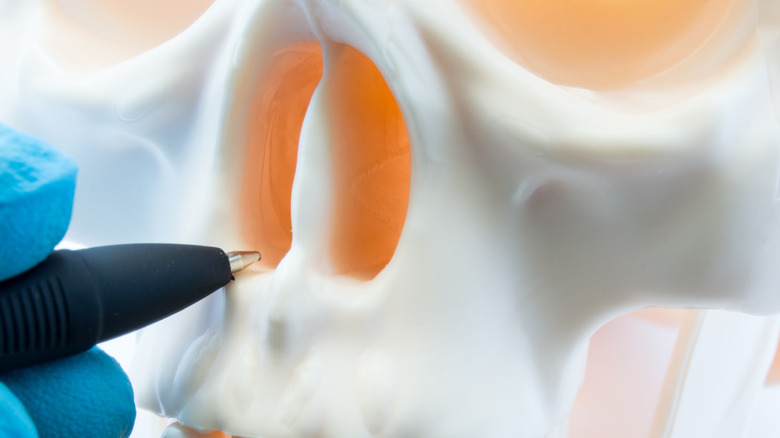This Is What Really Causes A Deviated Septum
If classic Saturday morning cartoons are to be believed, snoring is a natural step in getting a good night of sleep. The Mayo Clinic says that if it's infrequent, it is. But chronic snoring, particularly the kind that wakes up anyone else sleeping nearby, could be a sign of something more serious. And in some cases, that something might be a deviated septum.
The septum is the thin piece of cartilage that divides the human nose into two chambers or nostrils. Health Direct, a website maintained by the Australian government, explains that a deviated septum occurs when the septum leans more to one side than the other, creating a narrower opening in one nostril. This occurs naturally in many people, and most either don't notice or only experience mild issues. Medical intervention only becomes necessary when the symptoms become more severe.
Severe cases do sometimes occur naturally. However, there are many things that can shift a person's septum. And when that happens, the snoring that results can be worthy of any cartoon.
The easy way and the hard way
The idea of a naturally deviated septum may seem odd. But as the Cleveland Clinic explains, this is actually the most common reason people have one. Our noses change as we age, but the change is not just external. When the nose changes, the septum changes as well — and sometimes, it does this in a way that narrows the airway in one nostril. This might explain why someone's snores seem to get worse over the years.
There are also other, more abrupt processes that can cause a deviated septum. Johns Hopkins Medicine states that injuries and issues from previous medical treatments can lead to deviated septums. Some of these injuries include falls, car accidents, sports injuries, and being hit in the nose by accident or during a fight (via the Cleveland Clinic).
MedlinePlus, a site run by the U.S. National Library of Medicine, explains that it can take seven to 14 days for swelling to go down after nose injuries. Until then, doctors cannot properly assess a break. This means that, at least at first, it may be hard to tell if a septum has been affected by a broken nose. But if symptoms persist after that, it may be a good idea to ask a doctor to see if there's any new deviation.


